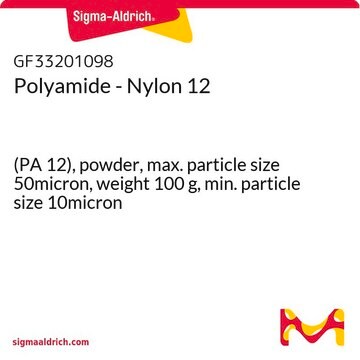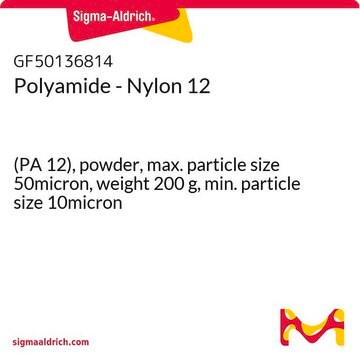All Photos(2)
About This Item
Linear Formula:
(C12H23NO)n
CAS Number:
MDL number:
UNSPSC Code:
12162002
PubChem Substance ID:
NACRES:
NA.23
Recommended Products
form
pellets
Quality Level
particle size
3-4 mm
transition temp
Tm 178 °C
Tg 37 °C
density
1.01 g/mL at 25 °C (lit.)
SMILES string
O=C1CCCCCCCCCCCN1
Related Categories
Application
- Replicating and Redesigning Ankle-Foot Orthoses with 3D Printing for Children with Charcot-Marie-Tooth Disease.: This study highlights the use of 3D printing with Nylon 12 for creating custom ankle-foot orthoses, enhancing comfort and functionality for pediatric patients. (Wojciechowski et al., 2022).
Storage Class Code
11 - Combustible Solids
WGK
WGK 3
Flash Point(F)
Not applicable
Flash Point(C)
Not applicable
Choose from one of the most recent versions:
Already Own This Product?
Find documentation for the products that you have recently purchased in the Document Library.
Customers Also Viewed
N H Stoffers et al.
Food additives and contaminants, 20(10), 949-959 (2003-11-05)
The migration of laurolactam and cyclic di- and trimer of nylon 12 was assessed using three different films and five food simulants (olive oil, isooctane, 95% ethanol, 50% ethanol, water). Substitute test conditions for migration into olive oil according to
[Use of mesenchymal stromal cells applied to composite materials to optimize bone tissue regeneration].
T Iu Tatarenko-Kozmina et al.
Patologicheskaia fiziologiia i eksperimental'naia terapiia, (1)(1), 8-10 (2007-05-29)
Kosuke Tomita et al.
Biotechnology letters, 25(20), 1743-1746 (2003-11-25)
A thermophilic bacterium, identified as a neighboring species to Geobacillus thermocatenulatus, having a growth optimum at 55 degrees C and, capable of degrading nylon 12, was isolated from soil by enrichment culture technique at 60 degrees C. At this temperature
N H Stoffers et al.
Food additives and contaminants, 20(4), 410-416 (2003-05-31)
Analytical methods for the determination of laurolactam--the monomer of nylon 12--as well as the cyclic dimer and trimer were established. High performance liquid chromatography using ultraviolet (HPLC-UV) and mass spectrometric detection (HPLC-MS) were both found suitable to identify and quantify
K R Williams et al.
Biomaterials, 8(4), 254-258 (1987-07-01)
Implantation of three different polymeric composite materials in the rat middle ear showed that the nylon prosthesis was encapsulated more rapidly than the two poly(methyl methacrylate) based implants. Several PMMA based implants were only partially covered at the 6 mnth
Our team of scientists has experience in all areas of research including Life Science, Material Science, Chemical Synthesis, Chromatography, Analytical and many others.
Contact Technical Service









